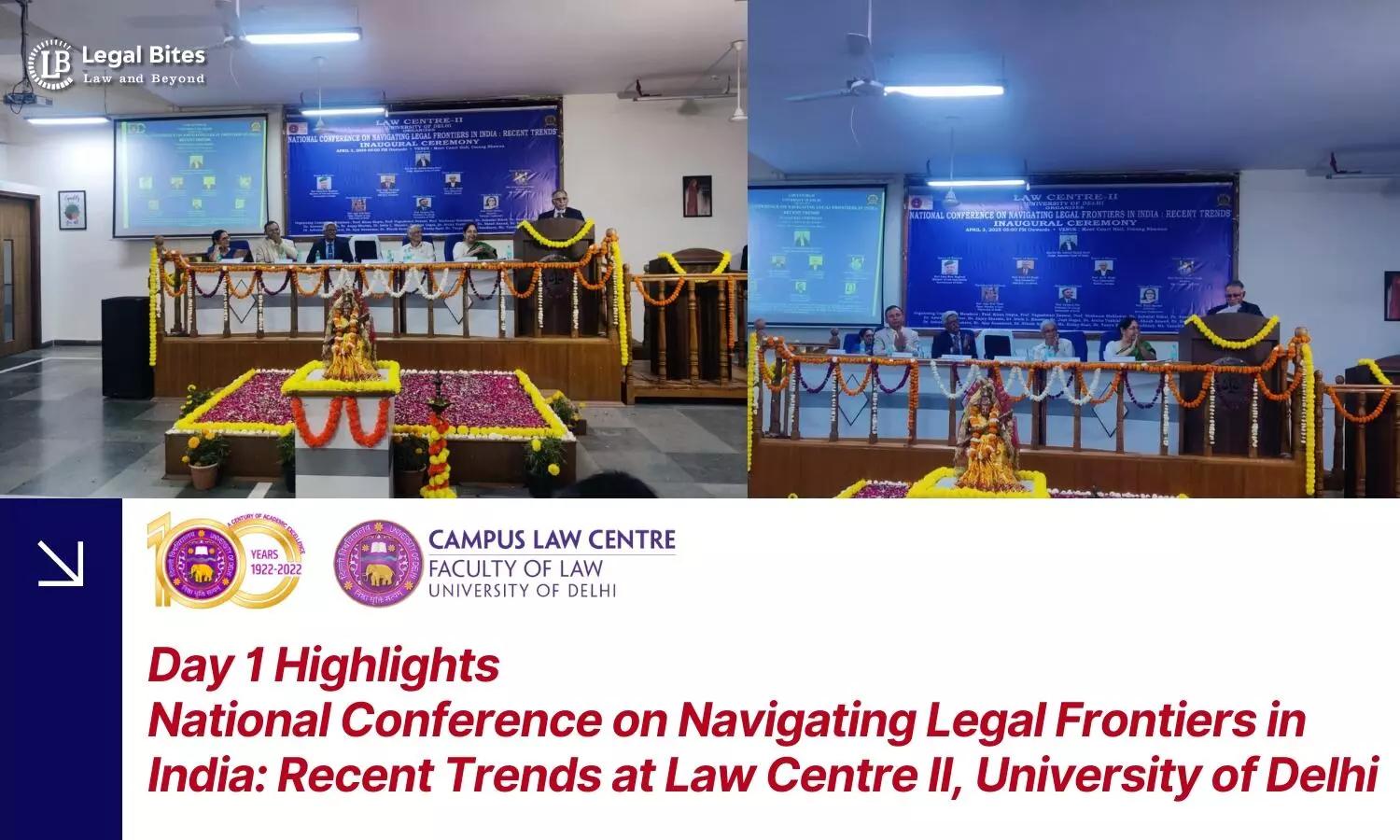Day 1 Highlights: National Conference on Navigating Legal Frontiers in India: Recent Trends at Law Centre II, University of Delhi
Law Centre II, University of Delhi, inaugurates its three-day National Conference with engaging addresses on emerging legal challenges and recent legislative trends—scroll down to read more!

New Delhi, April 3, 2025 — The prestigious Law Centre II, Faculty of Law, University of Delhi commenced its much-awaited National Conference on "Navigating Legal Frontiers in India: Recent Trends" today with a grand Inaugural Ceremony held at the Moot Court Hall, Umang Bhawan.
The event witnessed the esteemed presence of Hon’ble Mr. Justice Sanjay Karol, Judge, Supreme Court of India, who graced the occasion as the Chief Guest. The event was further enriched by the presence of two Guests of Honour — Prof. Amar Pal Singh, Vice-Chancellor, RMNLU Lucknow, and Prof. Jai S. Singh, Vice-Chancellor, RGNUL Patiala.
The ceremony began with a warm Welcome Address by Prof. (Dr.) Anupam Jha, Professor In-Charge, Law Centre II, who spoke about the Centre’s glorious legacy since its establishment in 1971. He highlighted the Centre’s contribution to legal education and its distinguished alumni including Hon’ble Brig. B.D. Mishra (Governor of Ladakh), Shri K.J. Alphons (Former Union Minister of Tourism), and Justice B.D. Ahmad (Former Chief Justice, Jammu & Kashmir High Court).
In her Presidential Address, Prof. Anju Wali Tikoo, Dean, Faculty of Law, University of Delhi, expressed hope and enthusiasm for the academic exchange that the three-day offline conference is set to offer. She welcomed all guests and participants while underlining the significance of the conference theme.
Insightful Keynotes from Distinguished Guests
Justice Sanjay Karol, in his keynote address, commended Law Centre II for hosting a timely and impactful conference. He noted the importance of creating forums that encourage dialogue on the evolving legal challenges brought by developments in technology, political thought, and societal transformation. He emphasized the role of academic and professional collaboration in addressing these pressing issues.
Prof. Amar Pal Singh, in his thought-provoking address, remarked, “Everything changes except the rule of change.” He discussed how the current pace of change — driven by AI, Blockchain, biotechnology, and cyber threats — presents legal challenges that demand urgent attention. He applauded the conference for providing a platform to engage with these emerging concerns.
Prof. Jai S. Singh lauded the initiative as a testament to Law Centre II’s commitment to legal research and education. He reflected on themes of jurisprudence and constitutional transformation, drawing on key judicial precedents to underline the dynamic nature of India’s legal landscape.
A Platform for Scholarly Exchange
Prof. Anupam Jha also shared the impressive response the conference has received nationwide. Despite initial hesitation to organize an offline event, the overwhelming number of quality abstract submissions led to a selective shortlisting process. The conference now stands as a hub for scholarly dialogue, peer interaction, and potential publication opportunities.
He further observed that the conference is timely in the backdrop of significant legislative activity, citing the passage of 16 Bills in 2024 and 49 Bills in 2023, all of which were assented to by the President of India. These developments underscore the need to critically examine emerging legal frameworks and their broader socio-political impacts.
The Vote of Thanks was delivered by Prof. Pinki Sharma, Director of the National Conference, who expressed gratitude to all dignitaries, participants, and organizing team members for making Day 1 a resounding success.
Stay Tuned for Day 2
With sessions lined up featuring paper presentations and expert panels, Day 2 promises to delve deeper into emerging legal trends, technological interventions in law, constitutional transformations, and policy shifts. The conference continues to bring together academicians, legal professionals, scholars, and students to navigate the frontiers of legal knowledge in India.

